Traveling around New Zealand in a motorhome or campervan is a thrilling and rewarding adventure. However, it’s essential to understand that there are specific regulations in place, particularly concerning parking.
Familiarizing yourself with the local campervan parking rules is crucial for ensuring a smooth journey free from unexpected costs or fines.
In this blog post, we will clarify the different types of RV parking available in New Zealand, explore various overnight camping options, and explain how to find suitable daytime motorhome parks. Additionally, we’ll highlight important rules, regulations, and helpful tips to make your travel experience enjoyable and hassle-free.
New Zealand is deeply committed to preserving its stunning natural environment. The regulations surrounding motorhome parking are designed to safeguard the country’s breathtaking landscapes while ensuring both locals and travelers can enjoy positive outdoor experiences.
Types of Motorhome Parking in New Zealand
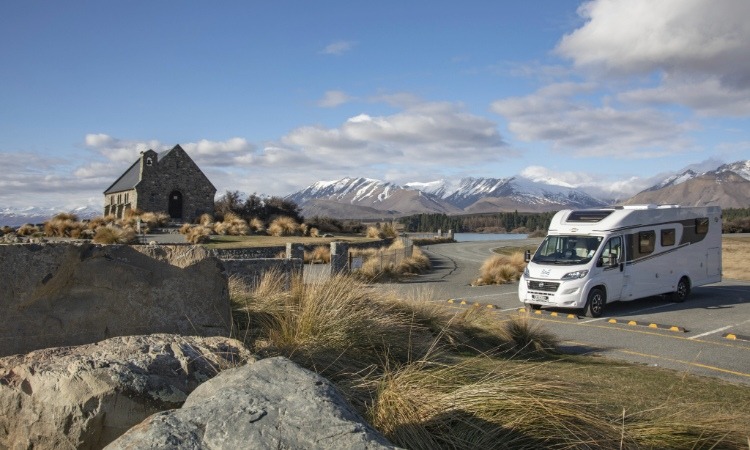
New Zealand’s dedication to environmental protection is evident in its campervan parking rules, which apply both during the day and overnight.
Expect specific regulations when parking in urban areas during the day compared to freedom camping or staying at holiday parks overnight. To avoid fines and ensure you’re parking in appropriate areas, it’s essential to familiarize yourself with the country’s parking regulations.
During the day, you have options such as designated motorhome parks, supermarket parking lots, rest areas, and some standard car parks. As night falls, you’ll need to secure a designated place for overnight accommodation, whether it’s a holiday park, Department of Conservation (DOC) campground, council site, or an approved freedom camping area.
|
Don’t park against traffic
Unlike parts of Europe and Asia, New Zealand requires vehicles to park in the same direction as traffic flow. You may pull over to park left, but crossing the road to park facing the oncoming traffic is not allowed. |
Daytime Parking for Your Motorhome

Daytime parking regulations for motorhomes generally mirror those for standard vehicles. You’ll find designated parking spots across cities, towns, and popular tourist locations, with some areas specifically set aside for larger vehicles like motorhomes.
Designated Motorhome Parks
Many cities and towns provide specific areas for recreational vehicles, often equipped with larger parking bays to accommodate their size. A prime example is the Boundary Street Car Park in central Queenstown, one of the few RV parking facilities that is conveniently located just a short walk from the lakeshore.
|
Boundary Street Caution
Ensure you enter and exit the Boundary Street Car Park in Queenstown via Gorge Road. If you rely on GPS navigation, you may inadvertently approach the lot via a narrow bridge not suitable for larger vehicles like motorhomes. |
Standard Public Car Parks
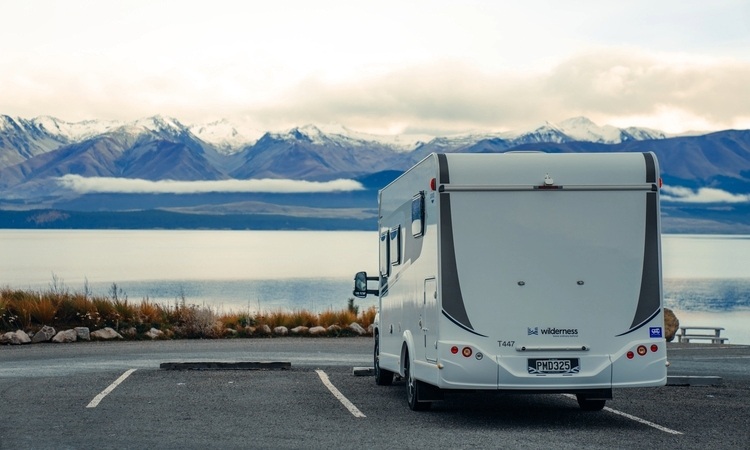
Parking a motorhome in standard public car parks is sometimes permissible if your vehicle fits within the designated space. However, it’s crucial to observe any signage indicating time restrictions or parking fees that may apply. Avoid obstructing traffic or pedestrian pathways.
In certain towns, the parking along the side of the road may be too narrow for a motorhome. Be cautious about parking across two spaces in a ticketed area, as you’ll likely receive a ticket for only using one meter.
Multi-Level Parking Structures
Parking buildings with multiple levels are generally not suitable for motorhomes and campervans due to:
- Height restrictions — Many multilevel buildings have low ceilings and tight clearances designed for standard vehicles, making them unsuitable for most RVs.
- Weight limits — Some parking structures impose weight limits that exclude larger recreational vehicles.
- Limited space — The narrow ramps and tight corners in these buildings can impede maneuverability for larger vehicles.
Supermarket Car Parks
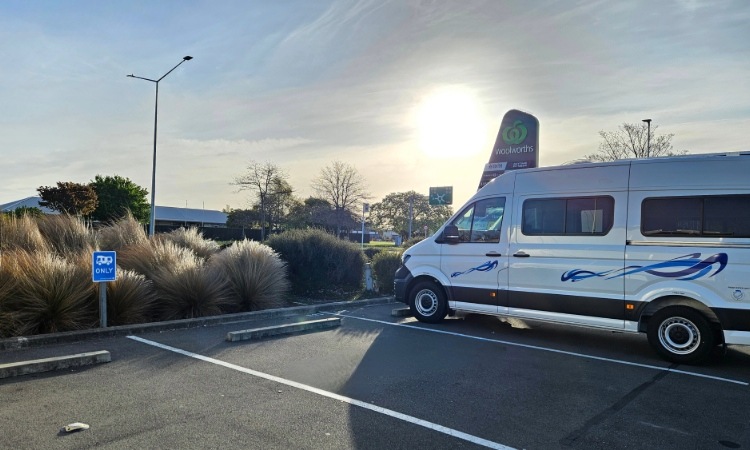
Some supermarkets provide designated parking spaces for larger vehicles, including motorhomes. Given that most motorhomes and some campervans are longer than a single regular parking space, you can usually park longitudinally across two spaces if larger vehicle spots aren’t available.
Always check for any signage and any restrictions concerning RV parking and allowed duration of stay.
Rest Areas and Scenic Locations

New Zealand features a host of picturesque tourist spots and tranquil rest areas along the road, making it easy for vehicles of all sizes, including campervans and motorhomes, to stop for a break.
While these locations are typically suitable for short daytime parking, most do not permit freedom camping overnight. Always check the onsite signage and consider downloading the CamperMate app from Google Play or the App Store for the latest rules and regulations.
Check out our top ten rest stops on New Zealand roads.
Overnight Parking for Motorhomes in New Zealand
Overnight parking regulations for motorhomes and campervans are typically stricter than daytime parking rules. Fortunately, New Zealand offers various accommodations including holiday parks, DOC campsites, and freedom camping spots.
Holiday Parks and Commercial Campgrounds

Commercial camping grounds, such as holiday parks, offer overnight parking along with a host of amenities, including:
- Powered and unpowered sites
- Shared kitchens and barbecue areas
- Bathroom and laundry facilities
- Recreational areas such as playgrounds, swimming pools, and game rooms
- Wi-Fi connectivity
Booking these campgrounds in advance is essential during peak summer and school holiday periods, while off-peak times often allow for impromptu stays.
These campgrounds are particularly ideal for families seeking outdoor enjoyment. Explore our blog on traveling with kids in a motorhome for more tips on how to keep young travelers engaged.
Department of Conservation (DOC) Campsites

DOC campsites are generally more affordable than holiday parks and are often situated in some of the country’s most picturesque locations. Facilities offered can range from a simple water tap to full kitchens and showers.
With over 200 DOC campsites available throughout New Zealand, not all locations are equipped for motorhome overnight parking. However, the sites that do offer these facilities provide a unique, rustic camping experience immersed in nature.
Some DOC locations operate on a first-come-first-served basis, while others may require advance booking, particularly during peak seasons. Visit the DOC website for availability and booking.
Learn more about motorhome camping at DOC sites in New Zealand.
Freedom Camping Locations
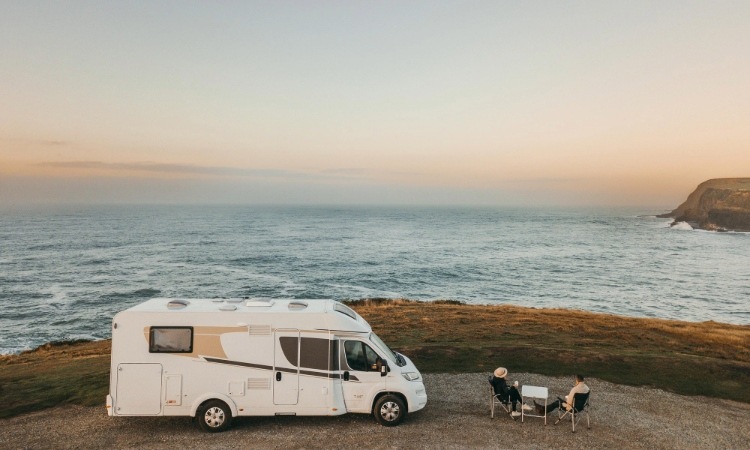
Freedom camping refers to staying overnight on public land outside established campsites or holiday parks. Many of these spots are among the best free options for campervan travelers seeking to immerse themselves in New Zealand’s stunning natural landscapes.
How to Locate Freedom Camping Areas
Despite its name, freedom camping doesn’t permit parking just anywhere. Doing so may lead to penalties from local authorities.
Ensure your motorhome rental displays a blue certified self-contained sticker, allowing you to camp in recognized freedom camping areas. To find the locations of these sites, you can:
- Check individual council websites — before arriving in those areas
- Visit i-SITE centers — upon entering each region
- Download popular NZ camping apps like CamperMate or Rankers Camping NZ for pre-trip research.
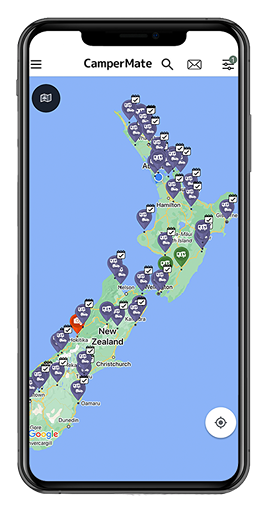
Discover more about freedom camping in New Zealand.
Council-Owned Camping Areas

Most local councils across New Zealand manage their own campsites located in scenic reserves, regional parks, and by water sources such as rivers, lakes, and the ocean. These campsites are excellent for overnight stays and range from basic to well-developed facilities, usually at a reasonable cost.
As with freedom camping, each council sets its own regulations for campervan and motorhome parking, meaning rules can vary from region to region. Some councils may allow freedom camping in specified areas while others may prohibit it altogether.
To avoid fines, check the local regulations on the respective council website before planning to stay overnight. Most campsites operate on a first-come-first-served basis.
Learn more about regional park camping.
Rules and Regulations for Freedom Camping and Parking Motorhomes
New Zealand has established national regulations for motorhome parking and overnight freedom camping, but the specifics depend heavily on the bylaws of each region and council.
National Freedom Camping Rules for Motorhome Travelers
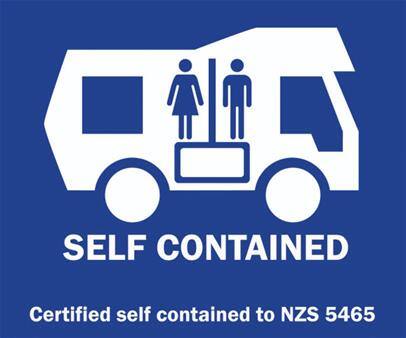
The Freedom Camping Act 2011 outlines the national regulations, defining what constitutes a self-contained recreational vehicle. It also grants local councils the authority to implement bylaws suitable for their regions.
When opting for freedom camping, you must:
- Camp in designated locations — as specified by local councils according to their bylaws
- Park only in permitted areas — ensuring not to overshoot or park when the designated spaces are full
- Use a certified self-contained recreational vehicle — one equipped with a toilet, waste storage, and both fresh and wastewater tanks.
|
Self-Containment Certification Changes
Upcoming changes are being implemented to enhance waste management and lessen the environmental impact of freedom camping in New Zealand. These changes include:
Motorhome rental operators must ensure their vehicles comply with the new standards to allow customers legal freedom camping. Each RV meeting the improved criteria will receive a green warrant. |
Regional Variations via Bylaws
Local councils may enforce their own bylaws regarding motorhome parking. Some regions may impose complete bans on freedom camping or restrict it to specific designated areas. To ensure a hassle-free experience, familiarize yourself with the regulations specific to the regions you plan to visit.
Find the website of your local council through Local Government New Zealand (LGNZ).
Penalties for Infringement
Ignoring New Zealand’s freedom camping regulations can result in substantial fines ranging from $200 to $1,000. Non-compliance with parking regulations may also lead to penalties.
Practicing responsible parking, both during the day and overnight, is essential to respecting the local environment and community while traveling in New Zealand.
Tips for Responsible Campervan Parking in New Zealand
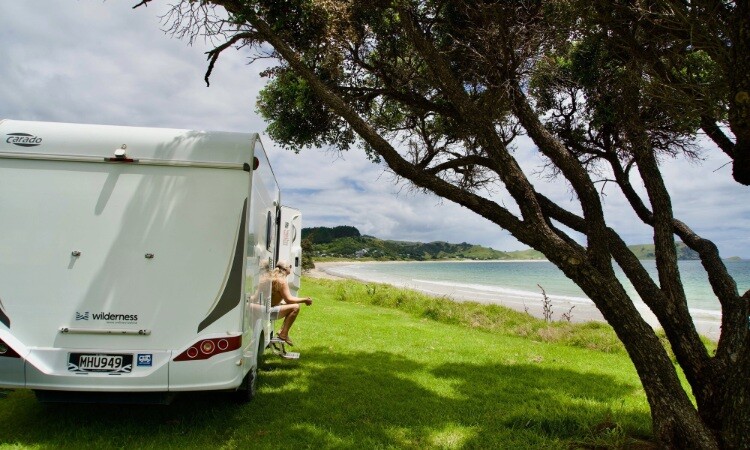
Follow these parking tips to help preserve New Zealand’s beautiful natural landscape and ensure positive experiences for your travel group as well as the local communities you encounter.
- Research parking options and regulations before your trip — so you know what to expect.
- Free daytime parking is often available in rural areas, while urban centers predominantly utilize paid parking systems.
- Freedom camping sites can be quite popular during peak travel seasons, so aim to arrive early in the day to secure a spot.
- Always check for signs or regulations upon arriving at a potential freedom camping location.
- Avoid parking in restricted areas — respecting the desires of local residents and the environment.
- Parking may be limited in busy tourist areas for oversized vehicles, especially during peak summer months and school holidays.
- Always dispose of your waste at designated dump stations — not overnight at freedom camping spots.
- Refrain from using multi-level parking buildings unless you’re sure they can accommodate your camper.
- Be mindful of your surroundings to minimize disturbances to local wildlife.
New Zealand offers numerous designated daytime parking options for motorhome travelers, along with a vast network of freedom camping sites, holiday parks, and council-run campsites for overnight accommodations.
Understanding the local regulations as you travel from region to region is essential to ensure that your adventures are free of issues and fully enjoyable.
Explore the best places to park your campervan throughout New Zealand.



